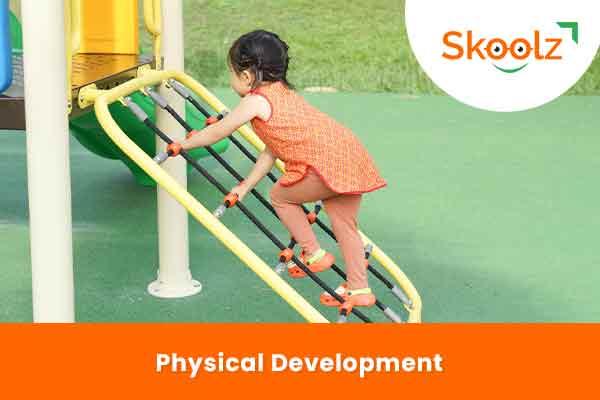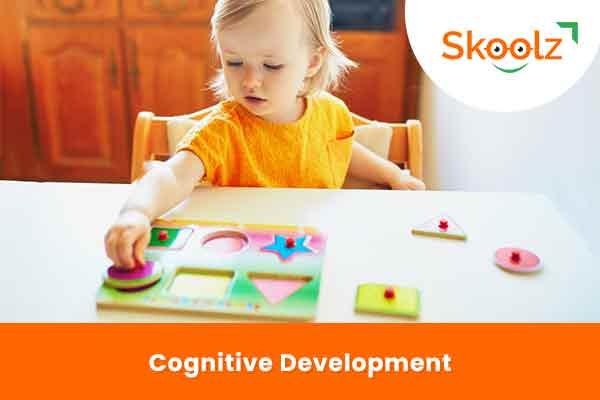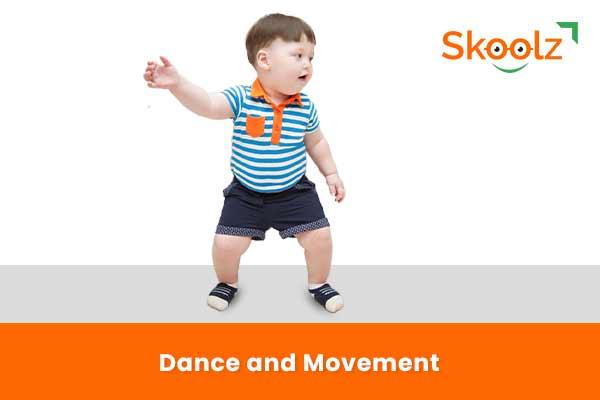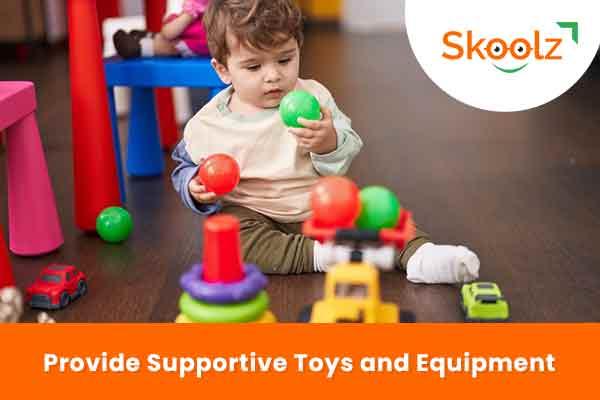
Unleashing the Power of Gross Motor Skills: Fueling Toddler Development
Unleashing the Power of Gross Motor Skills: Fueling Toddler Development
As toddlers embark on their journey of growth and exploration, one aspect of their development takes center stage: gross motor skills. These skills involve the coordination and control of large muscle groups, enabling toddlers to perform activities such as crawling, walking, running, jumping, and more. Gross motor skills lay the foundation for physical abilities and are essential for overall development. In this blog, we will delve into the significance of gross motor skills in a toddler's life and explore practical ways to foster their growth and mastery.
The Importance of Gross Motor Skills:
Gross motor skills serve as building blocks for various aspects of a toddler's life. Here are some key reasons why they are crucial:
1. Physical Development:

Engaging in gross motor activities helps toddlers develop strength, balance, coordination, and endurance. These skills are essential for accomplishing everyday tasks and participating in sports or physical activities later in life.
2. Cognitive Development:

Gross motor skills stimulate cognitive functions such as spatial awareness, problem-solving, and decision-making. As toddlers navigate their environment, they learn to assess risks, make judgments, and adapt to different situations.
3. Social Interaction:

Gross motor play provides opportunities for toddlers to engage with their peers and develop social skills. They learn to take turns, cooperate, and communicate while playing games or participating in group activities.
4. Emotional Well-being:

Active physical play promotes the release of endorphins, which contribute to positive emotions and stress reduction. It also provides a healthy outlet for energy, leading to better mood regulation and emotional well-being.
Fostering Gross Motor Skill Development:
Now that we understand the significance of gross motor skills let's explore some effective strategies to support their development in toddlers:
1. Create a Safe and Stimulating Environment:

Set up an environment that encourages movement and exploration. Clear obstacles, provide age-appropriate toys, and offer opportunities for climbing, crawling, and balancing.
2. Engage in Active Play:

Plan activities that involve running, jumping, hopping, throwing, and catching. Take your toddler to the park, engage in family-friendly sports, or organize playdates to promote gross motor skill development.
3. Incorporate Playful Challenges:

Introduce activities that challenge your toddler's coordination and balance. Set up obstacle courses, encourage balancing on one foot, or use stepping stones to enhance their motor skills and agility.
4. Dance and Movement:

Encourage your toddler to dance, imitate animal movements, or follow simple exercise routines. These activities not only enhance gross motor skills but also foster a sense of rhythm and body awareness.
5. Outdoor Exploration:

Nature provides a rich environment for gross motor skill development. Encourage your toddler to explore natural settings, climb on playground equipment, jump in puddles, or walk on uneven surfaces to enhance their physical abilities.
6. Provide Supportive Toys and Equipment:

Offer toys such as balls, ride-on toys, tricycles, and push toys that promote balance, coordination, and muscle development. Use age-appropriate equipment like balance boards or mini trampolines to enhance their gross motor skills.
FAQs:
Q1: How can I tell if my toddler is developing their gross motor skills appropriately?
A: Every child develops at their own pace, but you can look for age-appropriate milestones such as crawling, walking, running, jumping, and throwing. If you have concerns, consult with your child's pediatrician or an early childhood specialist for guidance.
Q2: What if my toddler seems hesitant or afraid to engage in gross motor activities?
A: Encourage and support your child gradually. Start with activities they feel comfortable with and gradually introduce new challenges. Offer reassurance and praise their efforts to boost their confidence.
Q3: Are there any safety precautions I should take during gross motor play?
A: Always ensure a safe environment by removing hazards, supervising closely, and providing age-appropriate equipment. Use protective gear like helmets and knee pads when necessary.
Q4: My toddler prefers sedentary activities. How can I encourage them to be more active?
A: Find activities that align with their interests and gradually introduce more active play. Offer choices and make it enjoyable by incorporating their favorite toys or themes into physical activities.
Q5: What if my toddler has developmental delays or disabilities that affect their gross motor skills?
A: Consult with healthcare professionals or specialists who can provide tailored guidance and interventions. They can recommend therapies, exercises, and adaptive equipment to support your child's specific needs.
Conclusion:
Engaging in activities that promote gross motor skills is essential for a toddler's development. By creating a safe and stimulating environment, encouraging active play, incorporating playful challenges, exploring nature, and providing supportive toys and equipment, parents can help their toddlers unleash the power of gross motor skills. Embrace the journey, celebrate milestones, and enjoy the precious moments of growth and development with your child.
Note: The information provided in this guide and the FAQs is for general informational purposes only and should not be considered as professional advice. Consult with healthcare professionals or specialists for personalized guidance based on your child's specific needs.

Bhawana Mohane
Digital Marketer

Unleashing the Power of Gross Motor Skills: Fueling Toddler Development
As toddlers embark on their journey of growth and exploration, one aspect of their development takes center stage: gross motor skills. These skills involve the coordination and control of large muscle groups, enabling toddlers to perform activities such as crawling, walking, running, jumping, and more. Gross motor skills lay the foundation for physical abilities and are essential for overall development. In this blog, we will delve into the significance of gross motor skills in a toddler's life and explore practical ways to foster their growth and mastery.
The Importance of Gross Motor Skills:
Gross motor skills serve as building blocks for various aspects of a toddler's life. Here are some key reasons why they are crucial:
1. Physical Development:

Engaging in gross motor activities helps toddlers develop strength, balance, coordination, and endurance. These skills are essential for accomplishing everyday tasks and participating in sports or physical activities later in life.
2. Cognitive Development:

Gross motor skills stimulate cognitive functions such as spatial awareness, problem-solving, and decision-making. As toddlers navigate their environment, they learn to assess risks, make judgments, and adapt to different situations.
3. Social Interaction:

Gross motor play provides opportunities for toddlers to engage with their peers and develop social skills. They learn to take turns, cooperate, and communicate while playing games or participating in group activities.
4. Emotional Well-being:

Active physical play promotes the release of endorphins, which contribute to positive emotions and stress reduction. It also provides a healthy outlet for energy, leading to better mood regulation and emotional well-being.
Fostering Gross Motor Skill Development:
Now that we understand the significance of gross motor skills let's explore some effective strategies to support their development in toddlers:
1. Create a Safe and Stimulating Environment:

Set up an environment that encourages movement and exploration. Clear obstacles, provide age-appropriate toys, and offer opportunities for climbing, crawling, and balancing.
2. Engage in Active Play:

Plan activities that involve running, jumping, hopping, throwing, and catching. Take your toddler to the park, engage in family-friendly sports, or organize playdates to promote gross motor skill development.
3. Incorporate Playful Challenges:

Introduce activities that challenge your toddler's coordination and balance. Set up obstacle courses, encourage balancing on one foot, or use stepping stones to enhance their motor skills and agility.
4. Dance and Movement:

Encourage your toddler to dance, imitate animal movements, or follow simple exercise routines. These activities not only enhance gross motor skills but also foster a sense of rhythm and body awareness.
5. Outdoor Exploration:

Nature provides a rich environment for gross motor skill development. Encourage your toddler to explore natural settings, climb on playground equipment, jump in puddles, or walk on uneven surfaces to enhance their physical abilities.
6. Provide Supportive Toys and Equipment:

Offer toys such as balls, ride-on toys, tricycles, and push toys that promote balance, coordination, and muscle development. Use age-appropriate equipment like balance boards or mini trampolines to enhance their gross motor skills.
FAQs:
Q1: How can I tell if my toddler is developing their gross motor skills appropriately?
A: Every child develops at their own pace, but you can look for age-appropriate milestones such as crawling, walking, running, jumping, and throwing. If you have concerns, consult with your child's pediatrician or an early childhood specialist for guidance.
Q2: What if my toddler seems hesitant or afraid to engage in gross motor activities?
A: Encourage and support your child gradually. Start with activities they feel comfortable with and gradually introduce new challenges. Offer reassurance and praise their efforts to boost their confidence.
Q3: Are there any safety precautions I should take during gross motor play?
A: Always ensure a safe environment by removing hazards, supervising closely, and providing age-appropriate equipment. Use protective gear like helmets and knee pads when necessary.
Q4: My toddler prefers sedentary activities. How can I encourage them to be more active?
A: Find activities that align with their interests and gradually introduce more active play. Offer choices and make it enjoyable by incorporating their favorite toys or themes into physical activities.
Q5: What if my toddler has developmental delays or disabilities that affect their gross motor skills?
A: Consult with healthcare professionals or specialists who can provide tailored guidance and interventions. They can recommend therapies, exercises, and adaptive equipment to support your child's specific needs.
Conclusion:
Engaging in activities that promote gross motor skills is essential for a toddler's development. By creating a safe and stimulating environment, encouraging active play, incorporating playful challenges, exploring nature, and providing supportive toys and equipment, parents can help their toddlers unleash the power of gross motor skills. Embrace the journey, celebrate milestones, and enjoy the precious moments of growth and development with your child.
Note: The information provided in this guide and the FAQs is for general informational purposes only and should not be considered as professional advice. Consult with healthcare professionals or specialists for personalized guidance based on your child's specific needs.

Bhawana Mohane
Digital Marketer




